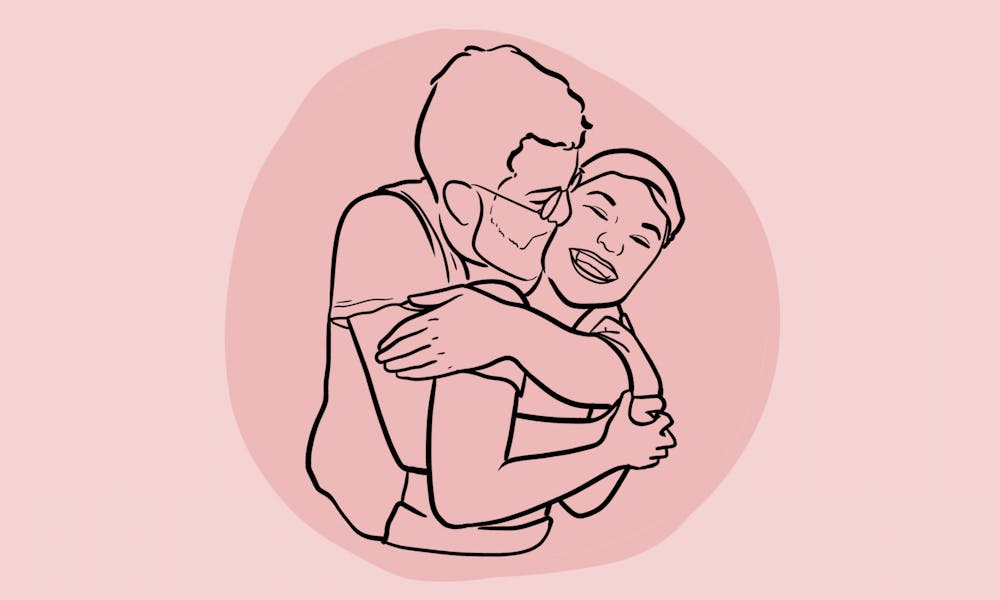It is a Sunday night and my friend is begging for a 'conference.' This, I soon discovered, is code for boy talk. We sit, legs pulled up on rolling desk chairs, with a Costco–sized container of jelly beans between us. “When is it acceptable to say I love you?” she asks.
“As soon as you want,” says one friend. She’s been in a relationship for nearly a year, and they do the kinds of things adventurous Brooklyn couples do—like listen to Tame Impala and go to dude ranches together.
“How long have you been dating?” replies another. He’s been in a relationship that’s lasted three times as long as Freaks and Geeks did, and his Instagram is a mosaic of meals and selfies shared.
“Never, ever during sex,” I say, the air of my joke masking the concern that’s suddenly pooled—like the slow drip of a runny faucet—in my stomach. It’s not that I don’t feel love—it’s the opposite actually. I feel too much of it, always, and I exist on the precipice of an accident, like a first–grader about to call his teacher "mom." Or at least I did, anyway, until I told the persistently nice boy from Tinder I thought I loved him thirty minutes into our third date.
Sometimes he jokes that means we hit some sort of jackpot, but mostly it makes me worry about the volatility of my own emotions. It doesn’t matter that he has said it back every day for nearly a year—in Trader Joe’s aisles and Ubers, during episodes of Jeopardy, and after hours of video games. What matters is that I have stumbled upon the sweetest of things and I spent the first six months of my relationship worrying that it would disappear.
My therapist once told me that I have an anxious—preoccupied attachment style, which is just a fancy way of saying that relationships give me anxiety because I am scared of losing the things I love. And while attachment styles are a product of childhood insecurities and fears, they stay with you forever. Nobody ever wants the anxious attachment one; it means you’re clingy, overemotional, and really good at loving things so hard you crush them. My therapist also told me that it doesn’t mean I’m undateable, just that it’s harder to date me. But isn’t that the same thing? Nobody ever asks for friction when someone else can provide smooth sailing.
And then I met Ben, who skipped work to buy me pickles on our first date and read my writing like it was holy.
Ben’s attachment style is secure and neurotypical, like the kind you see in Paul Rudd movies. When I tell him to stay home on the days I can barely muster the energy to put on a bra and some makeup, he comes over anyway and tells me he likes me better in pajamas. When I fear that every quarantine pound I gain will drive him toward a skinny girl in big pants and a tiny shirt, he makes me lunch. When I get so anxious after an argument that my body shakes and my breath falters, he reminds me that love doesn’t have a three–strike rule. While I’ve been busy constructing the dream–girl version of myself, Ben has been loving real–world Beatrice, who begs for cuddles, often struggles to get out of bed, and talked about marriage an hour into our 40th date.
Admittedly, loving Ben isn’t easy in the way acoustic guitar–heavy love songs led me to believe it would be. I still chastise myself every time he surprises me with presents, and I have nothing in return, or I ask for five more minutes in bed, and it makes him late to work. But I’ve become secure in my relationship anxieties, mostly because I know Ben loves me because of them and not in spite of them. I’ve spent years talking myself out of the things I need most in a relationship—monogamy, quality time, reassurance—because I thought men would mistake my earnestness for desperation and feel too burdened to reciprocate. Now I understand that my attachments don’t make love difficult. The fact that I was so concerned with hiding them does.
My favorite days are the ones where we luxuriate in my neediness. Few and far between, they follow a routine: I pretend to help Ben cook breakfast, and then we make a castle of my full–sized bed, pausing a diet of Netflix binges and Super Smash Bros. challenges to buy ice cream and chips at 7-Eleven. On those days, I don’t have to ask for more because Ben wants the same thing—to spend time unfettered by the expectation that we have to leave each other wanting.
Six months from now, Ben and I will be living together, cosplaying domesticity. It’ll probably feel like a fantasy for a week. He’ll make quesadillas for breakfast, and I’ll fold our laundry with some podcast in the background before we realize that sharing a bedroom means less time with one another and more time around each other, doing the mundane chores we used to do alone.
My old therapist would probably advise against this. She’d rattle off some DSM jargon about how my brand of love works best when it can breathe and call this an act of self–sabotage. Maybe she’s right. Or maybe she’s forgotten what Ben reminds me of every day: that love is not a ticking time bomb, and I don’t have to stop the clock to make it last.

